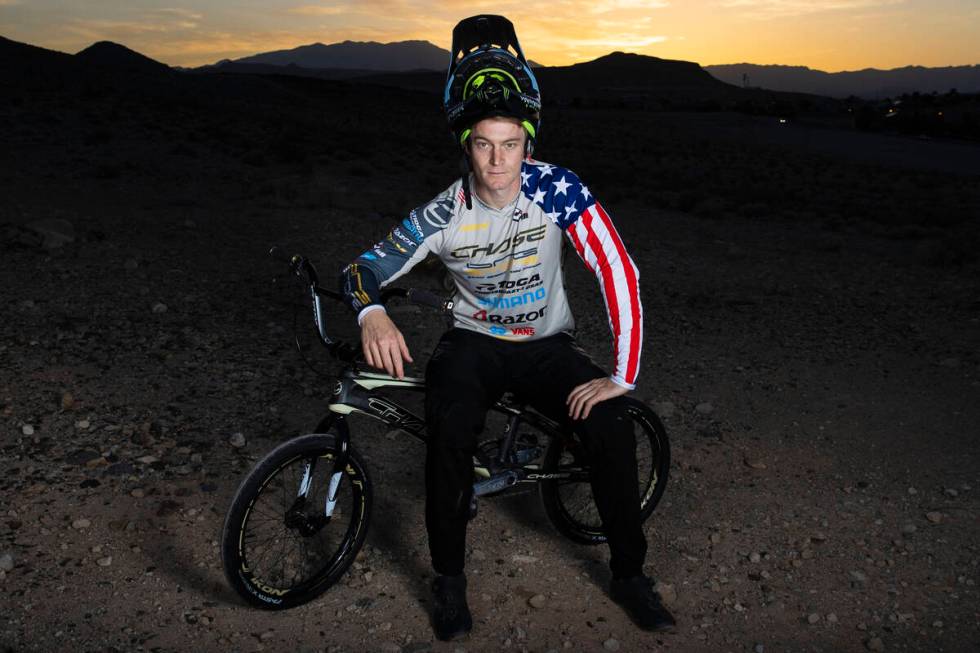Connor Fields says of Tokyo Olympics: ‘I have no memory of my final race’

Connor Fields was given three words early in the rehabilitation process and was asked to say them backward:
Chair, tree, curtain…curtain, tree, chair.
“I couldn’t do it,” he said.
He was also relayed a specific sentence and requested to repeat it.
“I couldn’t do that,” Fields said. “It was terrifying. I would ask, ‘Am I going to be like this forever?’”
Seems like a lifetime ago.
Fields is the Green Valley alumnus whose horrific BMX crash at the Tokyo Olympics led to his retirement in 2022. An elite athlete whose most serious injury among several was a subdural hematoma. Bleeding on the brain.
Time has healed all wounds and Fields is now thriving. He’s set to make his debut as an NBC commentator at the Paris Games.
He will lend his expertise in large part to the BMX competition, in which he won a gold medal for the U.S. at the 2016 Olympics in Rio de Janeiro.
He still loves the sport and is a natural fit for the assignment. It’s an opportunity to share with the country his passion and enthusiasm for BMX while explaining the discipline so people have a better understanding of how incredible these racers really are.
Their dreams hinge on the outcome of four years of sacrifice being determined in a 38-second race. Fields always embodied the Olympic spirit, was always thoughtful and respectful of its meaning. He arrived to BMX at age 7 after his mother noticed a flier for the sport in a Henderson bike shop and soon rode his first course.
He left it — at least the competitive side — after a crash that almost killed him.
“There’s always a piece of me, especially right now with the Olympics coming up and the vast majority of athletes competing that I competed against, where the juice says, ‘Oh, they’re lucky I’m not racing,’” Fields said. “But never once have I wished I was out there or made the wrong decision. I’ve been at peace with my decision.
“I really feel like I rung the towel dry and got everything out of my career that I possibly could. I didn’t leave anything out there.”
A TV host
He never thought of broadcasting as a postrace career, having earned a degree in business management from UNLV.
But then PBS — which had profiled Fields at different times during his BMX days — called. It was searching for a new host for the show “Outdoor Nevada.” He auditioned and got the part. Fields just concluded taping a second season while taking viewers across the state and introducing them to its multitude of outdoor adventures.
“I love it,” Fields said. “I also do a lot of keynote speaking. I’m 31 now. Just continuing to hone my skills as far as communication. It has been a natural transition, even though it wasn’t planned. Who knows what the future holds.”
He is appreciative given what he’s dealt with.
Fields’ bike touched wheels with another racer in a semifinal race in Tokyo, sending him sprawling to the ground. There was a pileup of bodies. He was in out and of consciousness for days.
The more time passed, the more stories he heard about what transpired following the crash.
“If anything, it has made me more thankful,” Fields said. “The further I get away from it, the more I hear about how bad it really was and how touch and go things were. It makes me so thankful than I’m fine and turned out OK and am doing all these amazing things and have this whole life in front of me.”
“My No. 1 priority is my heath. I want the ability to remember things. I don’t want to have brain issues. But with that being said, when you’ve dedicated your entire life to something and have a situation like that and are 15 minutes from a final and have a stroke of bad luck … I have no memory of my final race. I didn’t get to take my helmet off and smile and say, ‘Wow, what a journey.’ That was tough.”
Comeback to remember
This was the frustrating part: That unlike his other injuries — the broken bones, torn ligaments, collapsed lung — there was no set timeline for recovery from his brain injury. He was just told to stick with the rehabilitation, to not give up, to move forward as best he could. Time was the only prescribed tonic. And over it, he healed.
“I can go memorize an hourlong keynote presentation or go shoot my TV show and remember all these lines and facts,” Fields said. “It’s amazing. Mentally, I’m as sharp as I’ve ever been. I feel fantastic. And I don’t hit the ground anymore. I feel better than I have in years.”
Next stop: An NBC microphone at the Paris Olympics.
What a comeback indeed.
Contact Ed Graney at egraney@reviewjournal.com. Follow @edgraney on X.